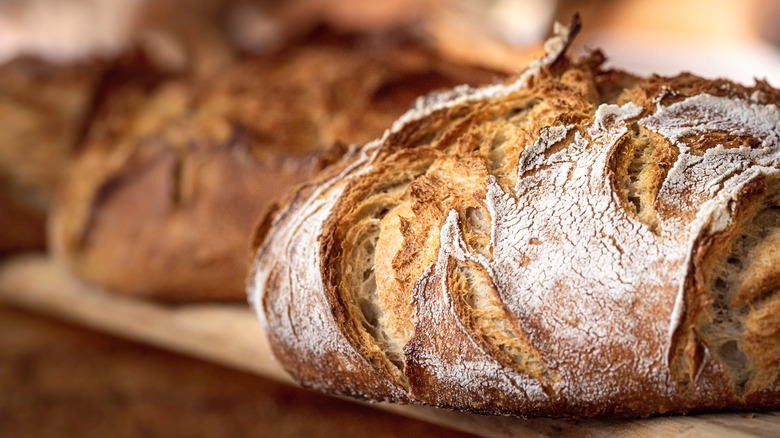The Surprising Reason You Should Be Eating More Sourdough Bread
Who doesn't love bread? From sandwiches to toast to croutons and even breadcrumbs, this starchy delicacy is one food we can't get enough of. Be it white bread or dinner rolls or a hearty loaf of seven-grain, bread holds a special place in our hearts even in these gluten-avoidant times. While the no carb trend is holding strong, another one has taken hold — perhaps counterintuitively — sourdough mania.
In the early days of the COVID-19 pandemic and quarantine, many home bakers started busting out sourdough like there was no tomorrow. And as these loaves graced many an Instagram post, people also started to note some of the health benefits of eating sourdough bread, which is made with a "starter" of flour fermented with water. For example, Eating Well reports that sourdough is good for your gut, can even lead to improved digestion, and even promotes healthy aging. As if that wasn't enough reason to toast up a slice right now, sourdough boasts another intriguing health benefit.
Sourdough bread can stabilize blood sugars
One of the oldest forms of leavened, or raised, bread, sourdough dates back at least as early as ancient Egypt (via NPR). People love sourdough for its yeasty, crusty, tangy goodness — but they also eat it to enjoy some of its health benefits. As pointed out by Eating Well, the fermentation process of sourdough yields a bread that boosts health in several important ways. Probiotics found in sourdough can improve gut health, and a diet that includes whole grain sourdough can lower risk of heart disease and cancer. And there's another reason to indulge in sourdough — it can help keep blood sugars in a healthy range.
According to Eating Well, eating carbohydrates such as bread causes our blood glucose to rise as we digest them. The problem, when eating simple carbs such as white bread and refined sugar, is that these blood sugar spikes are followed by crashes that can leave us feeling tired and irritable, and can also increase our risk of chronic diseases such as diabetes. But sourdough bread has a lower glycemic index and glycemic load than breads that are not fermented, meaning that the rise in blood sugar levels is far more stable and gradual. Whole grain sourdough, which has more fiber than white sourdough, is an even better choice for stable blood sugar. So the next time you're craving bread, reach for sourdough — your body will thank you.

